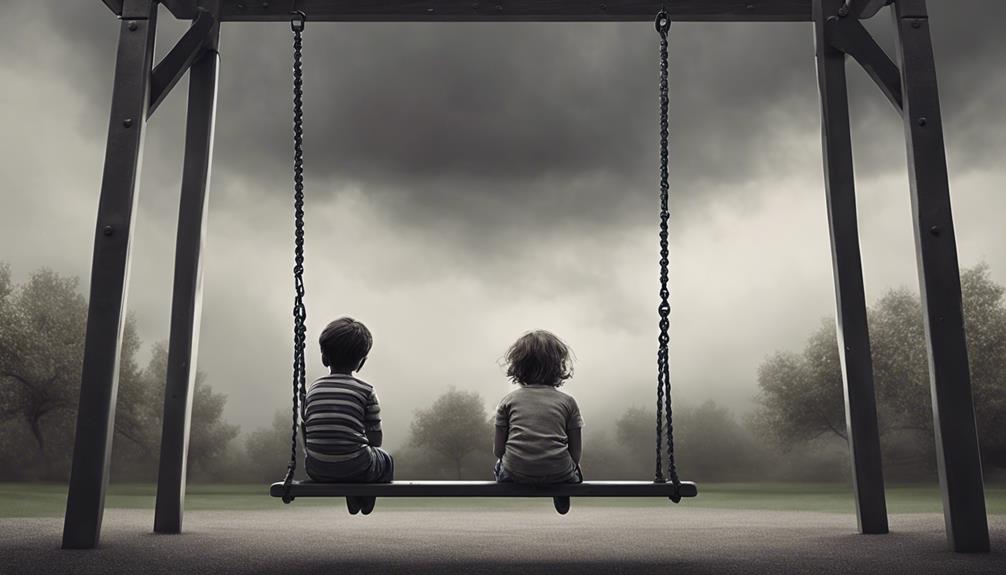Going through a divorce can be really difficult for all parties involved, but it can be especially tough on children. It is crucial to offer them the emotional support they need during this time.
From understanding their emotional needs to recognizing signs of distress, we can equip ourselves with tools to help them cope effectively. But how exactly can we ensure our kids feel emotionally supported in the aftermath of a divorce?
Let's explore some practical strategies that can make a significant difference in their well-being and adjustment post-divorce.
Key Takeaways
- Prioritize children's emotional needs with open communication.
- Create stable environments in both homes for security.
- Watch for signs of emotional distress and offer support.
- Consistent reassurance and love are crucial for children's adjustment.
Understanding Children's Emotional Needs
As parents navigating the complexities of divorce, it's crucial for us to understand and prioritize our children's emotional needs during this challenging time. Children going through a divorce may experience a whirlwind of emotions like shock, uncertainty, and anger, feeling like their world has been turned upside down.
It's our responsibility to create a safe space for our children to express these feelings openly. By actively listening to their emotions and providing reassurance, we can help them navigate this difficult period with greater ease. Many children may wrongly believe they're to blame for the divorce, so it's vital to communicate openly about the reasons behind the separation and repeatedly reassure them that it's not their fault.
Acknowledging and validating our children's feelings, while reinforcing their innocence in the situation, is key to supporting their emotional well-being post-divorce. Establishing trust through open communication lays a strong foundation for their emotional healing process.
Establishing Open Communication Channels

Understanding and responding to children's emotional needs post-divorce requires establishing open communication channels that prioritize listening and validation. When kids feel heard and understood, it can significantly impact their emotional well-being during this challenging time.
Here are four essential ways to create open communication channels with children:
- Encourage Expression: Support your child in expressing their feelings openly without fear of judgment. This fosters trust and emotional connection between you and your child.
- Create a Safe Space: Provide a safe environment where your child feels comfortable sharing their emotions. This promotes healthy coping mechanisms and helps them navigate their feelings.
- Active Listening: Listen attentively to your child's concerns and validate their emotions. This strengthens the parent-child bond and shows them that their feelings are valid.
- Understand Their Needs: By keeping communication open, you can better understand your child's needs and concerns, allowing you to provide the necessary support and help.
Establishing these communication channels can help children feel supported and know that they've a reliable family structure to fall back on during this time of transition. Remember, if needed, seek guidance from mental health professionals to ensure your child's emotional well-being.
Creating a Stable and Supportive Environment
To create a stable and supportive environment for children post-divorce, prioritize ensuring that both homes offer comfort and security for the child. It's crucial to minimize disruptions and maintain routines in both households to provide stability.
Help your children by encouraging them to personalize their space in each home, fostering a sense of belonging and ownership. Make sure they've necessities in both places, so they feel cared for and supported no matter where they are. By establishing consistent routines and smooth transitions, you can assist your child in adjusting to the new living arrangements.
This predictability can help them feel safer and more secure amidst the changes brought about by the divorce. Remember, divorcing parents play a vital role in creating a normal environment for kids during this challenging time. By offering this stability and support, your kids may find it easier to navigate their emotions and ultimately feel better as they adapt to their new normal.
Recognizing Signs of Emotional Distress

Let's now focus on recognizing signs of emotional distress in children post-divorce, as understanding these signals is crucial for providing the necessary support for their well-being.
Signs of Emotional Distress in Children Post-Divorce:
- Behavioral Changes: Look out for sudden shifts in behavior, such as increased aggression, defiance, or withdrawal.
- Physical Symptoms: Pay attention to complaints of headaches, stomachaches, or other physical ailments that could be linked to emotional distress.
- Emotional Indicators: Watch for signs of anxiety, depression, or mood swings that seem out of the ordinary for your child.
- Changes in Habits: Notice any disruptions in sleeping patterns, appetite, or interest in activities that could signify emotional struggles.
It's crucial to be attentive to these signs and offer a supportive environment where your child feels safe expressing their emotions. If needed, don't hesitate to seek professional help to ensure your child receives the necessary support during this challenging time. Remember, as parents going through a divorce, presenting a united front can provide stability and reassurance to your child as they navigate their feelings.
Providing Consistent Reassurance and Love
In providing post-divorce emotional support for children, consistent reassurance and love play a vital role in fostering their emotional stability and well-being. Children need to feel loved and supported, especially during times of change and uncertainty. Demonstrating love and affection consistently from both parents helps children feel secure and reassured post-divorce. Open communication about love and reassurance further reinforces a sense of belonging for children, making them feel valued and cherished.
Encouraging children to express their feelings about love openly is crucial in fostering their emotional well-being. By providing a safe space for children to share their emotions, parents can help them cope positively and adjust post-divorce. Offering continuous emotional support during these challenging times can significantly impact a child's ability to navigate through the changes and foster emotional well-being. Love and reassurance are powerful tools in helping children feel emotionally stable and supported as they navigate the complexities of divorce.
| Consistent Reassurance | Emotional Stability | Love and Affection |
|---|---|---|
| Open Communication | Sense of Belonging | Express Their Feelings |
| Emotional Support | Coping Positively | Adjust Post-Divorce |
Frequently Asked Questions
What Is the Best Therapy for Children of Divorce?
The best therapy for children of divorce is one that meets their unique needs. Play therapy, CBT, family therapy, art therapy, and support groups can all offer valuable tools to help kids navigate the emotional challenges of divorce.
How Do You Support Children After a Divorce?
We support children after a divorce by offering consistent love, listening attentively, and explaining that it's not their fault. Encouraging open talks, keeping routines stable, and fostering positive interactions with the other parent help create a secure environment for them.
What's the Hardest Age for Children to See Their Parents Split?
Elementary school-age children (6-12 years old) often find it hardest to witness their parents split due to their cognitive development and understanding of relationships. This age group may blame themselves and struggle with guilt and responsibility.
How Parents Can Help Their Children Cope With Divorce?
We help children cope with divorce by providing emotional reassurance, encouraging open communication, and creating stability. Our support includes maintaining a structured routine, avoiding conflict, and seeking professional help when needed.
Conclusion
As parents navigating post-divorce emotional support for our kids, let's remember the power of love, stability, and open communication.
Are we ready to prioritize our children's well-being and create a supportive environment where they can thrive?
By recognizing their emotional needs, offering reassurance, and being there for them every step of the way, we can help our children navigate this challenging transition with strength and resilience.
Let's commit to being their pillars of support and guiding them towards healing and happiness.










